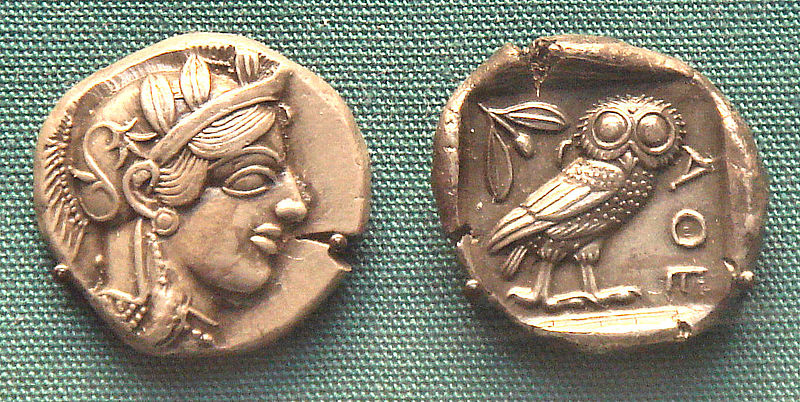 |
| Athenian coin, depicting the head of Athena and her owl |
Athens and Sparta would soon have to become allies in the face of the largest external threat ancient Greece would see until the Roman conquest. After suppressing the Ionian Revolt, a rebellion of the Greek cities of Ionia, Darius I of Persia, King of Kings of the Achaemenid Empire, decided to subjugate Greece. His invasion in 490 BC was ended by the Athenian victory at the Battle of Marathon under Miltiades the Younger.
Xerxes I of Persia, son and successor of Darius I, attempted his own invasion 10 years later, but despite his larger army he suffered heavy casualties after the famous rearguard action at Thermopylae and victories for the allied Greeks at the Battles of Salamis and Plataea. The Greco-Persian Wars continued until 449 BC, led by the Athenians and their Delian League, during which time the Macedon, Thrace, the Aegean Islands and Ionia were all liberated from Persian influence.
 |
| Attic red-figure pottery,ca. 480 BC (Paris, Louvre) |
Sparta was able to foment rebellion amongst Athens's allies, further reducing the Athenian ability to wage war. The decisive moment came in 405 BC when Sparta cut off the grain supply to Athens from the Hellespont. Forced to attack, the crippled Athenian fleet was decisively defeated by the Spartans under the command of Lysander at Aegospotami. In 404 BC Athens sued for peace, and Sparta dictated a predictably stern settlement: Athens lost her city walls (including the Long Walls), her fleet, and all of her overseas possessions.
No hay comentarios:
Publicar un comentario